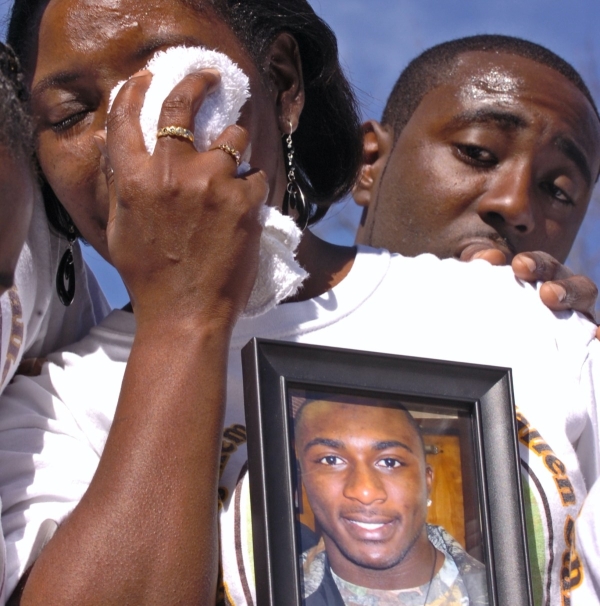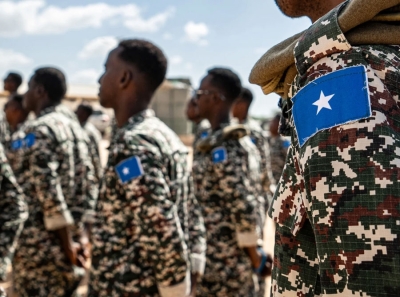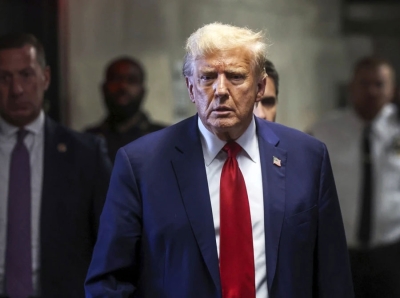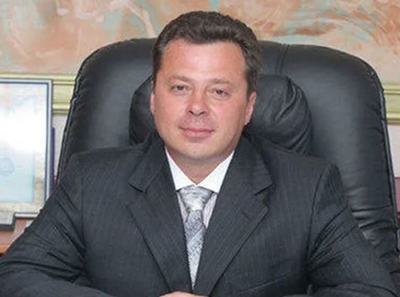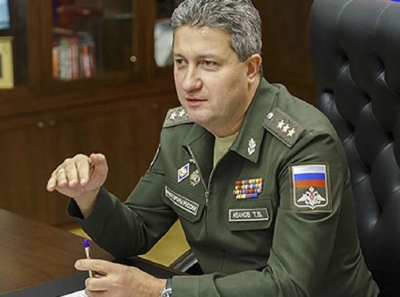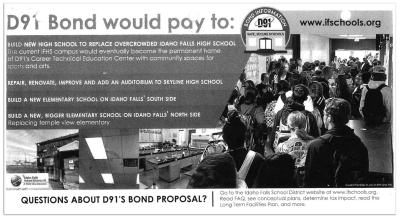On the morning of Billey Joe Johnson’s death, crime scene tape separates the Johnsons from their son’s body. Their shaky faith in the criminal justice system begins to buckle.
As Johnson’s family tries to get answers about his death, they get increasingly frustrated with the investigation. They feel that law enforcement officials, from the lead investigator to the district attorney, are keeping them out of the loop. While a majority-White grand jury rules that Johnson’s death was accidental, members of the family believe the possibility of foul play was never properly investigated.
This episode was originally broadcast in October 2021.
Photos


Dig Deeper
Listen: The whole Mississippi Goddam series
Read: The 2009 grand jury report regarding the death of Billey Joe Johnson Jr.
Explore: Dig into the case files and documents about the death of Billey Joe Johnson.
Credits
Reporters and producers: Al Letson and Jonathan Jones | Series editor and executive producer: Kevin Sullivan | Series producer: Michael I Schiller | Series digital editor: Nina Martin | Series assistant producer: Steven Rascón | Series production manager: Amy Mostafa | Series digital producer: Sarah Mirk | Fact checker: Rosemarie Ho | Reporting and producing help: Ko Bragg, Michael Montgomery and Laurel Hennen Vigil | Original score and sound design: Jim Briggs and Fernando Arruda with help from Claire Mullen, Najib Aminy, Brett Simpson and Ameeta Ganatra | Special thanks: Katharine Mieszowski, Alexis Toomer, Jen Chien, Esther Kaplan, Sumi Aggarwal and Christa Scharfenberg
Mama Blue sang our theme song, which was written and composed by Nina Simone. Thanks to the Nina Simone estate and Music and Strategy. News and sports footage of Billey Joe Johnson courtesy of Gray Media Group Inc., WLOX-TV. Thanks to Jackson State for letting us use its documentary.
Series photos by Imani Khayyam. Logo design by Joan Wong.
Support for Reveal is provided by the Reva and David Logan Foundation, the John D. and Catherine T. MacArthur Foundation, the Jonathan Logan Family Foundation, the Ford Foundation, the Hellman Foundation, the Robert Wood Johnson Foundation, and the Park Foundation.
Transcript
Reveal transcripts are produced by a third-party transcription service and may contain errors. Please be aware that the official record for Reveal’s radio stories is the audio.
| Al Letson: | From the Center for Investigative Reporting and PRX, this is Reveal. I’m Al Letson, and it’s May 1970. Tension blankets the country like a fog. The racial justice movements, women’s rights, and peace protests against the Vietnam War, well, it’s all coming to a head. And then Kent State. |
| Speaker 2: | Leave this area immediately. |
| Speaker 3: | Four people lose their lives, and nine are injured. The consequences are never justified. |
| Al Letson: | On May 4th, the National Guard shoot at anti-war protestors on Kent State’s Campus, killing four, and wounding nine students. College campuses across the country explode with calls for justice. At the historically Black college, Jackson State in Mississippi, students are fed up. Not just with the war and the violence at Kent State, but with years of dealing with racists driving through the middle of campus. |
| James “Lap” Bak…: | Cars used to come through there quite often. The white citizens used to come through, and sometimes they would holler out, or scream out obscenities, and throw eggs, and bottles, and bricks, or what have you, using the N word. |
| Al Letson: | That’s James “Lap” Baker. He was a student at Jackson State in 1970. On May 14th, just 10 days after Kent State, students in Jackson lash out. They throw rocks, anything they can get their hands on, at cars being driven by white people through the campus. That night, an old dump truck is set on fire. Students gather on both sides of the street to watch. |
| James “Lap” Bak…: | Came back that evening, there was another little incident, but everything settled down. All that started on the 14th, so the 15th was when we heard the marching. |
| Al Letson: | The marching sound was coming from the police. Around midnight, about 75 police officers show up armed with submachine guns, shotguns, and rifles. They move through campus like an invading force, stopping near Alexander Hall, one of the women’s dorms. Students watch from both sides of the streets as one officer calls through a megaphone, “Ladies and gentlemen…” |
| Before he can say anything else, someone throws a bottle at them. When it hits the concrete, it shatters with a pop. Police open fire into the crowd, shooting nearly 400 rounds. Later, police would claim it started because a sniper in the dorm building had been firing at them, but the FBI finds no evidence of a sniper. | |
| James “Lap” Bak…: | No sniper was on the fifth floor. And here again, let’s think logically. If there were a sniper on the fifth floor, you would not have hit all of these students on both sides of the campus of Lynch Street. No way. |
| Al Letson: | The police wound a dozen and kill two. |
| Speaker 5: | Two young Negroes, a high school student named James- |
| Al Letson: | 21-year-old pre-law student, Philip Lafayette Gibbs, and 17-year-old high school student, James Earl Green, who was just going home after work. No charges are ever filed, and no one is ever held accountable. Lap says what happened at Jackson State is a part of a long history. |
| James “Lap” Bak…: | Mississippi has always been a state that was very overt when it came to Blacks and whites. Certain things you can’t prove, because certain things are hidden. I think it had to do with who the individuals were, meaning Black students. It was racial, in my opinion. |
| Al Letson: | This is Reveal serial investigation. |
| Speaker 6: | (Singing) |
| Al Letson: | Mississippi Goddam, the ballad of Billey Joe. Episode 2: The Aftermath. We’re revisiting a series we first brought you back in 2021. It spans seven episodes of Reveal to tell the story of Billey Joe Johnson, a 17-year-old Black high school student, who reportedly shot himself during a traffic stop with a white deputy in Lucedale, Mississippi. |
| But this isn’t just the story of Billey Joe. It’s the story of America, and how tragedies, like the killing of young Black men at Jackson State, and the lack of justice and accountability, create the context for the world we live in. Incidents like that are why Billey Joe’s family never believed the official story of what happened to him, but that’s also an oversimplification. To really understand why the Johnsons lost faith in the investigation, you have to go back to the morning Billey Joe died, December 8th, 2008. | |
| It’s barely above freezing in Lucedale. The sun won’t peak over the horizon for another hour, or so. Just off Highway 26, in front of Benndale Carpet & Furniture, you can see Billey Joe’s muddy, maroon Chevy pickup truck. It sits like an abandoned dream in the parking lot on the edge of town. Next to the vehicle, Billey Joe’s body is lying on the ground. Police lights flash, as people drive by on their way to work or school. Now Lucedale’s a town of just 3,000 people, and it doesn’t take long for the word to spread. Something happened to Billey Joe at Benndale Carpets. | |
| R.J. Spivey: | My girlfriend at the time, in high school, she called me. You heard her, she was crying. She was like, “You hear what happened?” I was like, “No. What?” She was like, Billey dead.” “Oh, Billey dead?” She was like, “Yeah.” |
| Al Letson: | R.J. Spivey is one of Billey Joe’s closest friends. |
| R.J. Spivey: | I jumped up and went straight over there. |
| Al Letson: | On his way, he calls Chavis Jones, another good friend. |
| Chavis Jones: | He called, and was like, “Man, they say Billey killed himself.” And I’m like, “No, no.” He’s like, “Yeah,” he’s like, “We out here at Benndale Carpet, now.” I drove my car. I left my cousin at the house. I jumped in the car, and we get out there. |
| Al Letson: | Billey Joe’s aunt, Nancy Bradley, gets a call from someone who heard that Billey Joe had been in a car accident. She immediately leaves work. When she gets to the scene, she sees a small crowd. |
| Nancy Bradley: | I looked for my people’s, brothers, cousins, none of them was there. I was the only one that was kin to him there. Everybody else was, coaches, polices. Didn’t know some of them, because they was out of uniform, and they was all white people. I didn’t see no Black people. |
| Al Letson: | The police have blocked off the area with their cars. The ambulance is there, the sheriff, the coroner, the game warden, and two of Billey Joe’s football coaches. They’re all gathered around inside the crime scene tape, and they’re all white. Also, there are the sheriff’s deputies, Lucedale police officers, paramedics, the crime scene investigators. Most of them white too. |
| Nancy Bradley: | When I was going to the body, that’s when the police stopped me. I didn’t see no one else come over there where I was, or anything. Nobody. I was just sitting there trying to call everybody I can know on the phone. Nobody. It was hours. Hours. I sit, and talk to… No one still didn’t talk to me. |
| Al Letson: | A mixed crowd, with a lot of Black people, begins to gather down the street from the scene. |
| R.J. Spivey: | Well, they just had everybody… They had everybody backed off, roped out, where you couldn’t go up there. |
| Chavis Jones: | Police cars and stuff was there. Like I said, they parked us, or they made us go over by the barbecue place. That’s where they had us at, and they were, basically, you could see Billey’s truck from where we were standing. |
| Al Letson: | Billey Joe’s parents don’t have a working landline or cell phone, so it takes a bit longer for them to find out. When they arrive, a large group of people are already there. The Johnsons wade through the crowd to the edge of the scene, hands touching them, some eyes averted. Billey Joe’s mom, Annette barely contains her grief. They want to see their child to identify the body, to understand what’s happened here. Billey Joe Sr. says, they’re told… |
| Billie Joe John…: | You don’t come no closer. Annette right there. He said, “Y’all back on back, and we put a thing. None of y’all better not come past it.” |
| Al Letson: | He says the police officer looks him in the eyes, and says, “If you cross that line, I’ll shoot.” He’s told they have it all under control. |
| Billie Joe John…: | He said, “We got everything under control. We don’t need you over there.” What you got under? You ain’t got nothing under control. |
| Al Letson: | One of Billey Joe’s football coaches has already been asked to identify the body, while his parents are just a few yards away. |
| Speaker 11: | No, wasn’t treated fairly, no kind of way. Because point-blank, they thought to let me and my wife come up over there, or let me come if they didn’t let her come. Let me go over there, and see what’s what. |
| Al Letson: | A reporter asked Billey Joe’s mother, Annette, what she thinks. |
| Annette Johnson: | I can’t say nothing til let me see him, but I know he didn’t kill himself. |
| Al Letson: | But she doesn’t get to see her son’s body for several days. No one in the family does, not until after an autopsy’s performed in Jackson, and he’s sent back to a local funeral home. This will stay with the family, and many in this community, long after Billey Joe’s body is in the ground. |
| Two hours after the sheriff’s deputy radio’s in that Billey Joe shot himself, as a crowd continues to grow, a new vehicle pulls into the parking lot. It’s an unmarked police car, a black Dodge Charger, with its blue lights flashing. The car door opens, and a Special Agent from the Mississippi Bureau of Investigation steps out. A man named Joel Wallace. Wallace is a Black law enforcement officer. He knows exactly what the optics of this scene are. A Black teen dead on the ground. A white police officer pulled him over. Most of the white people are inside the police line. Most of the Black people are outside of it, cordoned off, with no voice. | |
| Wallace walks over to the family. He gives Annette a hug, and promises to investigate thoroughly. But Mississippi’s had a bad track record of investigating suspicious deaths, especially of Black men, and that system has been used to cover up racial violence preserving white supremacy. Now, Joe Wallace might be a Black man, but he’s also a cop with the same organization that shot up Jackson State in the ’70s, and killed James Earl Green, who was just 17 at the time. The same age as Billey Joe. | |
| The family and others might not be thinking about that specific case, but they feel the burden of it. When Special Agent Joe Wallace steps past the crime scene tape, he’s crossing a gap as wide as history. Meanwhile, down the road from the crime scene, Billey Joe’s friends, R.J. Spivey and Chavis Jones, get a phone call. It’s from another high school student, Hannah Hollinghead. She and Billey Joe had an on-again, off-again relationship. | |
| R.J. Spivey: | She’s like, “Meet me at the bank over there,” so me and Chavis slipped off, went up the road and met her. |
| Al Letson: | Do you remember what she told you? |
| R.J. Spivey: | Yeah, she said she heard somebody trying to come in the trailer. She said she got scared. She said she didn’t know it was Billey. I asked her, “You didn’t know Billey don’t shoot?” Like, “No, I didn’t know.” She said she called her mom. Her mom told her she was going to call the police. She said Billey stopped trying to get into the trailer, and came to a window, and said he was tapping at a window. She heard some sirens. When she heard the siren, he stopped, and she looked out the window, he was running to his truck. |
| Al Letson: | According to his ex-girlfriend, Billey Joe wasn’t going hunting that morning, like he told his folks. At least, not right away. All of this just leads to more questions for the Johnson family. Was Billey Joe running away from Hannah’s house when he got pulled over? What does the autopsy say, and who is Joe Sullivan, the deputy who pulled Billey Joe over? |
| By the end of the week that Billey Joe died, the Johnsons are becoming increasingly frustrated that they haven’t been kept informed on what was going on with the investigation. They feel like they’re being left in the dark, so Billey Joe Sr. starts looking for someone else to help them figure out what happened to their son. | |
| Billie Joe John…: | Everybody was coming around, and they said, “They ain’t giving you what you need to do,” so they said, “Well, just start talking to the NAACP.” Then we just went, and started with them, started meeting, talking with them. |
| Al Letson: | That’s next, on Reveal. From the Center for Investigative Reporting in PRX, this is Reveal. I’m Al Letson. |
| Speaker 13: | Good evening. Thanks for joining us. Billey Joe Johnson Jr’s family and friends will have to wait well into the new year for answers about the death of the George County football star. Rumors and speculation about the circumstances of his death have been swirling. |
| Al Letson: | In the days after Billey Joe’s death, the Johnsons, of course, were heartbroken. Not just from their loss, but by how they were treated at the scene of his death. They weren’t asked to identify his body, and Billey Joe Sr. is worried he will never see the results of the autopsy report. He says the police aren’t communicating with them, and they don’t know what’s happening in the investigation, so he decides to go public with his concerns. |
| District Attorney Tony Lawrence sets up a face-to-face meeting with the Johnsons. Afterwards, Lawrence tells the press it was a very informative and thorough meeting, but that’s not how Billey Joe Sr. remembers it. | |
| Billie Joe John…: | He had called us down there, one day, down there. He was saying about this happened, that happened, but I wouldn’t heard nothing that I wanted to hear. |
| Al Letson: | Even before that meeting, the family had been so upset, that they decided to get help from someone else. |
| Billie Joe John…: | Everybody was coming around, and they said, “They ain’t giving you what you need to do,” so they said, “Well, just start talking to the NAACP.” Then we just went, and started with them, started meeting, talking with them. |
| Curley Clark: | Initially, NAACP had a prominent part to play in that, because the initial way that they wanted to try to frame it was a suicide. |
| Al Letson: | Curley Clark was the vice president of the NAACP in Mississippi. He says early on, the DA was leaning into a suicide theory. |
| Curley Clark: | They were putting that out there, that Billey Joe was distraught because Hannah had rejected him, and that he panicked when the officer turned on his blue lights, and that he ultimately took his own life. We didn’t buy that scenario. |
| Al Letson: | How did you back that up that it wasn’t a suicide? |
| Curley Clark: | Well, from the standpoint of his state of mind, the situation that he was… I think he was within a week or so getting the letter to go to a prominent school. I don’t know if it was- |
| Al Letson: | Auburn. |
| Curley Clark: | Auburn. He was looking forward to it. Talked to a number of persons, and his family and friends, and so on and so forth. He had too much to live for, then to be a person who’s a suspect to take his own life. |
| Al Letson: | The NAACP starts its own investigation following leads from the community. They interview 15 people, and hear that Hannah’s parents were against her relationship with Billey Joe, that her family had ties to the police department, and that some of the cops didn’t like Billey Joe. |
| Curley Clark: | We got that information, and we tried to follow up from that standpoint. We made that information known to District Attorney’s office, and requested that they take that into consideration, because we weren’t allowed to interview Hannah, or her mother, or father, or the police officers involved. |
| Al Letson: | While the NAACP works on its investigation, the family reaches out to other civil rights organizations, like Color of Change and the ACLU, and they get a lawyer. |
| Curley Clark: | The family contacted the Johnny Cochrane firm, and once they did that, I took a backseat to it. I gave them all the information that I had, and then they were going to go forward. |
| Al Letson: | Jerome Carter worked out of the mobile office of the law firm, founded by the late Johnny Cochrane, a big time defense attorney who gained fame for representing OJ Simpson. |
| Speaker 15: | Recently I was in a car accident, and my lawyer got me $3.5 million. |
| Speaker 16: | Stop lying. You’re an actor. You know you didn’t get no $3.5 million back. Tell the truth, come on baby. |
| Jerome Carter: | I’m attorney Jerome Carter. If you want keep most of your money, call me right now. |
| Speaker 16: | That’s what I’m talking about, baby. Wow. |
| Al Letson: | But Carter was not Johnny Cochran. Most of his cases focused on personal injury, criminal defense, and family law, but still, he gives it a shot. He conducts interviews, hires a private eye, and gets an independent autopsy. He believes Billey Joe was outside of his truck, with the door open, when the shot was fired. |
| In media interviews, Carter says he doesn’t believe Billey Joe could have killed himself, either by accident or on purpose. Investigators never seriously consider whether his death was a result of foul play, according to the case files we have. While Wallace, the Cochrane firm, and the NAACP are doing their own separate investigations, the Johnsons are dealing with their grief. Dan Wetzel, a journalist for Yahoo Sports, sees it firsthand. | |
| Dan Wetzel: | There’s no devastation like a parent losing their child, particularly in a circumstance where nothing makes sense. They were very kind people, very humble people. |
| Al Letson: | Dan meets with the family while they’re waiting to hear what investigators came up with. While he’s there, they show him Billey’s truck. |
| Dan Wetzel: | The truck had never been washed. I’m not going to say it was the same as the crime scene because this was, I don’t know, maybe six weeks later, or five weeks later, but there was forensics tape on it. The back of the truck still had all sorts of letters from colleges recruiting Billey Joe. There was ACT books, there was college books, there was homework, and then all around where the driver’s side door was, there was still remains of Billey Joe’s head from the gunshot. It was somewhat surreal to see. |
| Al Letson: | Surreal, but also concerning. According to the official story, Billey died right next to this truck. It’s very much a part of the crime scene. With the truck back, Billey Joe’s dad tries to draw his own conclusions. |
| Dan Wetzel: | Here’s a father trying to analyze the blood evidence, the splatter evidence, on the side of a truck that, obviously, none of us are equipped with the expertise to do, but there really wasn’t any other option at that point. |
| Al Letson: | Two months of waiting, with rumors in the community, questions from the family, and silence from the authorities. Then the day comes. Monday, February 9th, 2009. Nearly 150 friends and family gather in the morning at George County Courthouse. |
| Speaker 19: | We want justice served- |
| Speaker 20: | We want truth. |
| Speaker 21: | We want justice. |
| Speaker 20: | We want justice. |
| Speaker 21: | We want truth. |
| Speaker 20: | We want truth. We want justice. |
| Al Letson: | Wearing T-shirts, “In memory of our Rebel,” with a photograph of Billey Joe in his football uniform, they hold up signs, “Community for justice. Who murdered our hero?,” And, “Justice in 2009, not 1900.” |
| Curley Clark: | It was a very tense situation, because the word was out in Lucedale that Billey Joe’s death wasn’t by his own doing. |
| Al Letson: | There’s news footage of District Attorney Tony Lawrence making his way to the courthouse. On the way, he’s presented with petitions. |
| Speaker 22: | This is who they have behind them. These are the 25,000 petitions, that they’re- |
| Al Letson: | The petition expresses grave doubts that Billey Joe could have shot himself, and calls on the DA to thoroughly investigate inconsistencies in the case, instead of taking the police version at face value. In the TV clips, Lawrence seems unsure what to do with these petitions. |
| Speaker 22: | Okay? All right. |
| Tony Lawrence: | Thank you so much. |
| Speaker 22: | Thank you. |
| Tony Lawrence: | Y’all going to keep these? |
| Speaker 22: | Oh, they yours. |
| Tony Lawrence: | Thank you. |
| Al Letson: | Lawrence then makes his way to the chambers. The grand jury is chosen by the DA. In Billey Joe’s case, 18 of the 20 jurors are white. Only the District Attorney and his team are authorized to present evidence. There are no transcripts, so everything that happens in that chamber is secret. We don’t know exactly what they heard, or how the evidence was presented, but we have the list of people who the grand jury was scheduled to hear from that day. |
| Special Agent Joel Wallace, the other investigators, cops, the medical examiner, Hannah Hollinghead, her mother, folks from the crime lab, and several people who said they drove by the traffic stop. Out of the first 17 witnesses scheduled, Wallace is the only Black person. Near the end of the day, the DA calls the other Black witnesses. There are 12 of them. Many were Billey Joe’s family members, Billey Joe Sr. | |
| Billie Joe John…: | When they called me in there, I went in there in front of the grand jury, saying what I had to say. They called another in there, but we don’t know who going up in there, when they had the grand jury up in there. |
| Al Letson: | His aunt Nancy. |
| Nancy Bradley: | They didn’t ask me anything. But when I got on the scene, when I come to the scene, I said they didn’t ask me anything about him. They just asked me, “How was he?” |
| Al Letson: | His uncles, Don Galloway and Arthur Fairley. |
| Don Galloway: | They asked some questions about his love life. |
| Arthur Fairley: | Well, I just tell them what I know, and I just felt like they were hiding a lot of stuff from us that wasn’t adding up. |
| Al Letson: | Some family members, and other Black witnesses, feel like they were just called for show, as some kind of proof that authorities had listened to them. During that one day session, the grand jury heard from 30 people, and reviewed 65 exhibits. By that Tuesday, newspapers were reporting that the grand jury had made up its mind, and would reconvene on Thursday to announce its decision. The mood at the courthouse is just as intense as the first day. Everyone is on edge. Reporter Dan Wetzel is in the courtroom watching |
| Dan Wetzel: | The courtroom was full. It certainly was notable that, in the crowd, there was, I think I counted about 100 African Americans, and there were just four white citizens there, to hear what had happened, which was obviously a notable ratio that would cause someone to pay attention. |
| Al Letson: | The Johnsons and their extended family pack into a side room to meet with District Attorney Lawrence. He tells them what the grand jury decided before announcing it to the public. Arthur Fairly, Billey Joe’s uncle, is furious. |
| Arthur Fairley: | Tony Lawrence was there, and he wanted to explain what was going on, that Billey had killed himself. He was telling us all of that, and I was telling him, “No, that’s not true.” Too much evidence there that don’t prove up to that. You can’t take no gun and from the gun inflicted wound that you got, and said he killed himself. It just don’t add up, the way everything looked to me. I finally sat down and just be quiet, because I was getting pissed off and getting angry. |
| Al Letson: | Billey Joe Sr. says the DA’s explanation is absurd. |
| Billie Joe John…: | How can you get a big long gun like that, and put it to your head, and shoot you, and when you laid down and the gun laid on top of you? That don’t seem right. If you got that gun away from you, you’ve got it by the barrel, or whatever, and it accidentally shoots you, that gun going to go out the other side of the truck, or whatever. It ain’t going to stay right there where you at. Now, and that gun kicked like a mule. I know. |
| Dan Wetzel: | I remember them all coming out of a side meeting room at the courthouse, and just seeing, again, the pain and the anguish on the Johnsons’ face. |
| Speaker 26: | The grand jury unanimously finds that the only plausible and scientific explanation for this incident is that the Sears and Roebuck 12 gauge shotgun accidentally discharged. |
| Al Letson: | The grand jury finds that Billey Joe’s death was accidental, beyond a reasonable doubt, and that Deputy Sullivan was in his patrol car at the time. They say Billey Joe accidentally shot himself while trying to move his 12 gauge shotgun in the cab of his truck. |
| Speaker 19: | The nine-page grand jury report, which outlines 15 findings of fact, was read before the packed courtroom of Judge Robert Krebs. |
| Speaker 26: | The grand jury finds that Deputy Joe Sullivan could not have shot and killed Billey Joe Johnson Jr., as the forensic evidence, and the wound track of Billey Joe Johnson Jr., does not support homicide. |
| Al Letson: | District Attorney Tony Lawrence. |
| Tony Lawrence: | I suspect he was probably trying to maneuver the gun, in a place to where he was trying to either unload it, or get it out of the car to unload it, or something of that nature, and it discharged on him. |
| Patrice Clark: | The grand jury’s findings in Billey Joe Johnson Jr’s death were met with disbelief outside the George County Courthouse. |
| Speaker 28: | What’s the next step? |
| Billie Joe John…: | Well, we’re talking about it. We haven’t decided, but we are going further with it. |
| Speaker 28: | You don’t agree it was an accident? You don’t think your son accidentally shot himself? |
| Billie Joe John…: | No. I really don’t believe that. But I ain’t accused nobody of nothing, but I really don’t believe that. |
| Patrice Clark: | In the past two months, nothing has turned out the way the football star’s parents thought it would. Instead of looking forward to their son’s senior year of high school, they’re heartbroken and disappointed. |
| Billie Joe John…: | Really, I ain’t got no comment, because my heart is hurting too bad right now. I ain’t feeling too good right now. |
| Al Letson: | The video of the family outside the courthouse is a memory trapped in amber. You can see the deep sorrow, the anger, in real time. This was the Johnson’s big hope. They felt their questions and concerns were ignored. Questions and concerns that came from their lived experiences in Lucedale, but also rooted in systemic racism. They thought they’d get answers. Instead, they head back home, convinced that authorities had not gotten to the truth. |
| When we come back, we start asking some questions the family felt were left out of the investigation. My reporting partner, Jonathan Jones, and I start by recreating the route Billey Joe took the morning of his death. | |
| This is a really tight window, right? According to the GPS we’re going to get there right around the time that he… GPS says we’ll be there, right now, at 5:24. What’s your speed right now? | |
| Jonathan Jones: | Going 65. |
| Al Letson: | This is Reveal. |
| From the Center for Investigative Reporting and PRX, this is Reveal. I’m Al Letson. | |
| After the grand jury, the Johnson family is still left with so many unanswered questions. They didn’t believe the official story, that Billey Joe had shot himself. They felt investigators didn’t take their concerns seriously. We needed more details about what investigators came up with that led the grand jury to its decision. So on a cold December morning, more than a decade after Billey Joe’s death, reporter Jonathan Jones and I get up before the sun. | |
| We decided to retrace what happened that morning. It’s difficult, because the time codes from the 9-1-1 calls, police dash cams, and dispatch logs, were all over the place. They don’t match up at all. We’re going to base the timing on the information that Special Agent Wallace got during police interviews. As we go, we’re going to play back some of the interviews and other materials in the case file. | |
| Now we don’t know if what people say in these interviews is true or not, but it will help us figure out where to start asking questions. We begin with an interview from Billey Joe’s uncle, Don Galloway. He told police that Billey Joe got up early that day. | |
| Don Galloway: | 5:10, exact to be. |
| Al Letson: | Don lives behind Billey Joe, in another trailer. He remembers the exact time, because his wife woke him up early to give her a ride to work. |
| Don Galloway: | Got to Billey house about 5:11. Junior pulled out in front of me. |
| Al Letson: | So that’s where J.J. and I start, at Billey Joe’s trailer, at 5:11 AM. |
| Jonathan Jones: | All right, starting now. |
| Al Letson: | Stopwatch starting. We pull out and head towards the highway. |
| GPS: | Proceed to the route. |
| Al Letson: | It’s early, so there isn’t a lot of traffic. |
| GPS: | Turn right onto Deep Creek Road. |
| Al Letson: | The early morning darkness on these back roads is complete. For uncle Don, it’s only Billey Joe’s taillights, and the occasional sign breaking the night. Then his radar detector goes off. |
| Don Galloway: | Beep, beep. Then I say, “Baby, there’s one coming at us.” When I passed him, you can see his whole light on top, and you can see the whole police car. Both people’s in the car, two heads in the car, I seen, the police car. “All right,” I said, “Baby, that’s him.” |
| Al Letson: | Don’s riding dirty. His license is suspended, and he doesn’t want to get pulled over. He sees Billey Joe turn down Fig Farm Road, a dark stretch that’s a shortcut to Lucedale. Don continues driving on the main road into town, while Billey Joe drives off with a cop car following behind him. |
| Don Galloway: | Then he slowed down by the Fig Farm Road, and turn off right behind Billey Jr. The exact same way. |
| Al Letson: | As Don looks in his rearview, he has one thought. |
| Don Galloway: | I said, “Well, Baby, Junior going over to that girl house again.” |
| Al Letson: | That girl is Hannah Hollinghead. Billey Joe’s on-again, off-again girlfriend, and this is where things get complicated. Billey Joe told his family he was going hunting. Uncle Don says he saw Billey Joe heading towards a trailer where Hannah’s dad lives. Her folks were divorced. We pull up across the street from Hannah’s trailer. Here’s Hannah’s first interview with investigators on the day Billey Joe died. |
| Hannah Hollingh…: | It was about 5:26 this morning, and I was laying in the bed, and I heard, it sounded like my screen door opened. My dog started barking, and I told him to be quiet. I grabbed my glasses, because it sounded like somebody was trying to break into my house. |
| Al Letson: | She sounds young. She had just turned 17 when all of this happened. Hannah says her dad was at work. |
| Hannah Hollingh…: | My dog’s barking, and then I hear this big knock on the door, like somebody’s trying to beat the door in, coming in. I got my phone, and called my mama, and said, “Mama, hurry fast. Someone’s trying to break in.” |
| Al Letson: | Her mom, Esther Parker, is sitting next to her throughout the interview. |
| Esther Parker: | I said, “What’s wrong? She said, “Mama, someone is trying to break in the trailer, please hurry.” I explained to her, call 9-1-1, that I would get up and get there as soon as I could. |
| Hannah Hollingh…: | But I was too nervous, and I couldn’t, because I didn’t know what to do because I thought he was fixing to come in. So my mama called 9-1-1. |
| Dispatcher: | George County 9-1-1, what’s the location of your emergency? |
| Esther Parker: | Yes ma’am, it’s the trailer park is located right across the funeral home. I’m not sure the street address. |
| Dispatcher: | Okay. |
| Esther Parker: | My daughter is in a trailer up there, and she just called and said it sounds like someone is trying to break in the trailer, and she’s in there by herself. |
| Al Letson: | J.J. and I sit in the parking lot of the funeral home, waiting until 5:31 to continue the route. Waiting for a minute takes a long time. |
| Jonathan Jones: | She says that he got there around 5:24 and then he left around 5:31, 5:32. That’s several minutes of trying to wake up Hannah. |
| Al Letson: | Hannah says her mom called back. |
| Hannah Hollingh…: | About 5:32, 5:31, she called, and asked if I was okay, just checking on me. Then I heard him coming around to my window, and tap on my window, on my bedroom window. Then I just sat on the bed, and my dog was still barking, going crazy. Then I heard a siren. I knew that was my chance to look out the window, and see who it was. I seen Billey running to his truck that he had parked across the street from the trailer park. |
| Al Letson: | Now, according to Hannah’s account, Billey Joe was at her place from 5:26 to 5:32. That seems weirdly specific to me, and a long time to be banging loudly on someone’s door that early in the morning. She says, “Billey Joe hears sirens, gets back in the truck, and heads down Oak Street.” |
| Jonathan Jones: | Yeah, it’s worth noting that Oak Street, the street that Billey Joe was driving down, leads you right to the police department. Literally, it’s like a block away from where he turns off. |
| Al Letson: | We continue down the same road. |
| Jonathan Jones: | Now this area is well lit. We’re basically right outside the main downtown strip. There are streetlights, traffic lights, and Christmas lights up as well. |
| Al Letson: | This is where George County Sheriff’s Deputy Joe Sullivan enters the case. He tells investigators he was just coming on duty, planning to meet his partner at the Waffle House. He says he sees a red truck run a red light on Highway 26, and starts to follow him with his lights on. |
| Joe Sullivan: | He was flying, probably 40, 45, 50 miles an hour. |
| Speaker 35: | It wasn’t like he slow rolled. |
| Joe Sullivan: | It wasn’t no casual role through it. |
| Speaker 35: | He blew it. |
| Joe Sullivan: | He was going so fast. He just about didn’t make a turn, right there in front of O’Reilly’s, in the left-hand lane, [inaudible] went around. |
| Al Letson: | Sullivan says he turned on his lights, and follows the truck, roughly, for a mile and a half. Billey Joe pulled over in Benndale Carpet’s parking lot on the edge of town. |
| Joe Sullivan: | 10-39, it’s going to be on Highway 26, in front of Benndale Carpets. Point eight is Boy, John, Sam, Zebra. Boy, John, Sam, Zebra, personalized tag. |
| Dispatcher: | 10-4. George-10, that Boy, John, Sam, Zebra, comes back to a Billey Johnson in McLean should be a ’99 Chevy red and other in color. Expiration’s one of ’09. |
| Al Letson: | Deputy Sullivan’s patrol car didn’t have a camera, so we can’t verify his account of the traffic stop with Billey Joe. Joe Wallace, the investigator we told you about earlier, interviewed Sullivan the day Billey Joe died. Here’s what Sullivan says happened. |
| Joe Sullivan: | I got out of the vehicle to talk to the driver about the violations. He exited the vehicle, handed me his driver’s license, and advised me that the reason he ran a stop sign was because his mother was sick. I advised him to have a seat in the vehicle. I was going to check his driver’s license. |
| Al Letson: | He returns to his patrol car with Billey Joe’s driver’s license. He says Billey Joe went back to his truck. |
| Joe Sullivan: | He sat right on the edge, turned towards the door. |
| Joe Wallace: | Okay. Do you know the position of his legs? His legs been out of the truck, or in the truck? |
| Joe Sullivan: | I think they were just kind of sitting on the edge, facing the door. |
| Joe Wallace: | Facing the door? |
| Joe Sullivan: | Yeah. |
| Joe Wallace: | Okay. And the door was open the truck? |
| Joe Sullivan: | Yes. |
| Joe Wallace: | Okay. Then, you said you went back in, and attempted to run the driver’s license. You raised your glasses or on. |
| Joe Sullivan: | I reached up to get my glasses to read the license, and looked down. I grabbed the mic to call in the license, and I heard the gunshot and the glass break. |
| Joe Wallace: | Okay. |
| Joe Sullivan: | I looked up, and saw him fall with the gun in his hand. |
| Joe Wallace: | Saw him fall with the gun in his hand? |
| Joe Sullivan: | Yeah. |
| Joe Wallace: | Okay. Then your actions after that was what? |
| Joe Sullivan: | I called dispatch. |
| I’m going to need an investigator at my location. Fucker shot himself. | |
| I advised him what happened, to send me a paramedic and some help. I got out, walked up to check him, and see that he was obviously dead. | |
| Al Letson: | Benndale Carpet has long since closed, but the building is still there. Over a decade later, J.J. and I park close to where Billey Joe died. |
| Jonathan Jones: | All right, so this is approximately where Billey Joe was. I would say that this area is pretty well lit, in the sense of it’s still very dark out here, but the storage units have lights on them. Now also, you have to remember that we’re here, and behind us would’ve been a police car with the flashing lights hitting it as well. |
| It is 5:37 right now. | |
| Al Letson: | In going through the case files, investigators never challenged Sullivan’s version of events. They appear to accept what he says as the truth without digging much deeper. One way they might’ve been able to verify part of the story was by pulling surveillance footage from Route 26, the road where Sullivan followed Billey Joe. They passed banks, the hospital, and fast food restaurants, all places that tend to have video cameras. |
| Chavis Jones: | I think a camera somewhere should have caught something. |
| Al Letson: | Billey Joe’s friend, Chavez Jones, again. |
| Chavis Jones: | I don’t know how good the camera was at the bank back then, but the ATM has a camera, and that ATM at a corner. It should have caught something. |
| Al Letson: | Yeah. |
| In 2008, Chavis was a high school football player. But today, he works as a sheriff’s deputy in the next county over. | |
| How long have you been in law enforcement? | |
| Chavis Jones: | I guess if you add on my corrections time, and all, since like 2012. I started out at State Penitentiary, in Greene County, in 2012. I’ve been in it ever since. |
| Al Letson: | I wanted to know what he’d make of Sullivan’s account now, through the lens of law enforcement. So we play him an interview that Sullivan did with investigators. |
| Joe Sullivan: | I got behind the vehicle, I was probably 25 yards behind it, and it went through the four-way intersection at Highway 26, and O-63. I followed it for about maybe half a mile, and it pulled into the parking lot of the Benndale Carpet store. |
| Chavis Jones: | I would’ve handled that totally different. For instance, you initiate your lights there, and he doesn’t stop. Y’all bend to Benndale Carpet? |
| Jonathan Jones: | Yeah. It’s a good little bit. |
| Chavis Jones: | … far away. |
| Jonathan Jones: | Right. |
| Chavis Jones: | That’s a pursuit. If you initiate lights that far ahead, and he don’t stop, you’re in a pursuit. Whenever vehicle comes to a stop, you’re going to come out your vehicle, at gunpoint, and get them out the vehicle. They’re going to be detained. You’re basically going to do what they call a felony takedown, because this person is running from you. At that point, you’re thinking they’re running for a reason. Something going on, that they’re running. The calmness that he had doesn’t make sense. |
| Al Letson: | Although Deputy Sullivan pursues Billey Joe for a mile and a half. Sullivan doesn’t call it in until they get to the Benndale Carpet store. |
| Chavis Jones: | Like I said at that distance, because when you initiate lights, if I begin to do a traffic stop, I’m going to let dispatch know, “Hey, I’m trying to go signal three at this vehicle. They ran a stop sign.” I’m going to try to get them a license plate. If they don’t stop in the reasonable amount of time, “Hey dispatch, they’re still rolling. They’re not stopping.” Me, at that point, if my backup’s close, I’m going to get them rolling to me. Like I said, because you never know what’s fixing to go down at this point. Some people stop, and come out the car shooting. You know what I’m saying? |
| Joe Sullivan: | I advised him to have a seat in the vehicle. I was going to check his driver’s license. |
| Chavis Jones: | In the academy, they teach you if somebody gets out the vehicle, don’t let them get back in. Because if they get out, you could be separating them from a weapon. You let them get back in, you give them that second thought to maybe pull that weapon, and try to use it. The way that they said it happened, you got somebody that ran a stop sign. If you’re pursuing this person, or this person drives farther than you expected them before they stop, after you initiate your lights, if that person get out the vehicle, I’m not letting them get back in. |
| Al Letson: | Something else from the official version of events stands out. Hannah’s statements about Billey Joe banging on her door for five minutes. On the day Billey Joe died, Hannah told Chavis and R.J. the same thing she told police. I asked R.J. about it. |
| I’m sure, at the time, all of y’all are just reeling, because your best friend just died, right? But in retrospect, if Billey was banging on her door, wouldn’t he say, “It’s Billey?” | |
| R.J. Spivey: | Yeah. |
| Al Letson: | And if he’s tapping at the window, wouldn’t he be like- |
| R.J. Spivey: | Hannah? |
| Al Letson: | Hannah? |
| R.J. Spivey: | Yeah. |
| Al Letson: | Looking back, this doesn’t make sense to Chavis, either. |
| Chavis Jones: | He always used to go to her house when her dad left work. It didn’t make sense that she say he was trying to break in, and that she didn’t know who it was. It didn’t make sense. Who else would be coming to your house at that time of morning? It’s hard for me to believe that she didn’t know it was him. I don’t understand that part. Because we all knew that he went to her house in the morning time. We all knew. So just her saying that she didn’t know who it was, and she didn’t know until he ran out and jumped in the truck, that don’t make sense. |
| Al Letson: | Now we’ve been through the official story of what happened the morning Billey Joe died, based on what we found in the case files, but the files don’t answer all the questions. Like we said, we really don’t know the exact time of events, because the police time codes from recordings and logs don’t match up. Another thing; Billey’s friends said he’d go to Hannah’s house in the morning all the time. So why did she think he was breaking in? Sullivan said Billey Joe was flying down Highway 26. Why didn’t the officers who went to Hannah’s house see him? They were driving up the same road that Billey Joe was supposedly going down. Then there’s a point Chavis brought up. |
| Chavis Jones: | Y’all been to Benndale Carpet? That’s a pursuit. |
| Al Letson: | That Benndale Carpet’s is a good ways from where Sullivan first turned on his lights. And at that stop, why did Billey Joe get out of the car after police pulled him over? Why would he have reached for his shotgun? These are some of the questions the Johnson’s are left with too. But when they met with the District Attorney, they say they didn’t get answers, and couldn’t believe the grand jury’s decision. We mentioned how Billey Joe’s dad was afraid he would never see the autopsy report. Well, we have that report, and next week we take a closer look. We start by examining the system that handles autopsies in Mississippi. |
| When Billey Joe Johnson dies, in December of 2008, what’s the state of the medical examiner’s office at that point? | |
| Speaker 37: | It was absolutely in transition. Things were still messy. They’re still messy now. |
| Al Letson: | We take the autopsy report to outside experts. |
| Speaker 38: | The original pathologist actually did a pretty decent job in describing the injuries, and saying where the skull fractures are. So the error was in the interpretation. |
| Al Letson: | And finally, we meet the woman who conducted Billey Joe’s autopsy. |
| Adele Lewis: | My name’s Adele Lewis. I’m the State Chief Medical Examiner for the State of Tennessee. |
| Al Letson: | And show her another report that says she got it wrong. |
| Adele Lewis: | Who wrote this? Is this a person who’s trained, at all, in forensic pathology? Because it doesn’t seem like it. |
| Al Letson: | That’s next time on Reveal. |
| If you want to dig into the documents we found while reporting this story, they’re available on our website at revealnews.org/casefiles. That’s revealnews.org/casefiles. You’ll find the grand jury report, police investigative files, the autopsy report, and all the source documents that we use to put this story together. | |
| Our show was reported and produced by Jonathan Jones and me, and edited by Kevin Sullivan. Michael I. Schiller is our series producer. Steven Rascón, the assistant producer, Alaa Mostafa, the production manager, and Nina Martin, the digital editor for the series. We had additional reporting and producing help from Ko Bragg, Melissa Lewis, Michael Montgomery, and Laurel Hennen Vigil. Thanks to Reveal’s Katharine Mieszkowski, and thanks to former Revealers Jen Chien, who helped launch the project, Alexis Hightower, Esther Kaplan, Christa Scharfenberg, Sumi Aggarwal, and Sarah Mirk. | |
| Mama Blue sang our theme song, which was written and composed by Nina Simone. Thanks to her estate and music and strategy. We got news and sports footage of Billey Joe, courtesy of Grey Media Group and WLOX TV. Our fact-checker is Rosemary Ho. Victoria Baranetsky is our general counsel. Our production managers are the Wonder Twins, Zulema Cobb, and Steven, my brother from another mother Rascón. Original score and sound design by the dynamic duo, J. Breezy, Mr. Jim Briggs and Fernando, my man, yo, Arruda. They had help from Claire C-Note Mullen, Najib Aminy, Brett Simpson and Ameeta Ganatra. | |
| Our CEO is Robert Rosenthal. Our COO is Maria Feldman. Our interim executive producers are Brett Myers and Taki Telonidis. Support for Reveals provided by the Reva and David Logan Foundation, the Ford Foundation, the John D and Catherine T MacArthur Foundation, the Jonathan Logan Family Foundation, the Robert Wood Johnson Foundation, the Park Foundation, and the Helman Foundation. Reveal is a co-production of the Center for Investigative Reporting and PRX. I’m Al Letson, and remember, there is always more to the story. |

